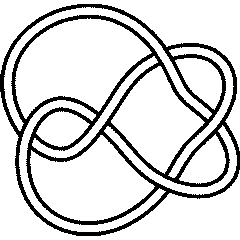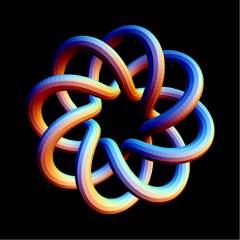The Kauffman Polynomial: Difference between revisions
No edit summary |
m (Reverted edit of 66.150.105.20, changed back to last version by DrorsRobot) |
||
| Line 3: | Line 3: | ||
The ''Kauffman polynomial'' <math>F(K)(a,z)</math> (see {{ref|Kauffman}}) of a knot or link <math>K</math> is <math>a^{-w(K)}L(K)</math> where <math>w(L)</math> is the writhe of <math>K</math> (see [[The_Jones_Polynomial#How_is_the_Jones_polynomial_computed.3F|How is the Jones Polynomial Computed?]]) and where <math>L(K)</math> is the regular isotopy invariant defined by the skein relations |
The ''Kauffman polynomial'' <math>F(K)(a,z)</math> (see {{ref|Kauffman}}) of a knot or link <math>K</math> is <math>a^{-w(K)}L(K)</math> where <math>w(L)</math> is the writhe of <math>K</math> (see [[The_Jones_Polynomial#How_is_the_Jones_polynomial_computed.3F|How is the Jones Polynomial Computed?]]) and where <math>L(K)</math> is the regular isotopy invariant defined by the skein relations |
||
<center><math>L(s_ |
<center><math>L(s_+)=aL(s), \qquad L(s_-)=a^{-1}L(s)</math></center> |
||
(here <math>s</math> is a strand and <math>s_\pm</math> is the same strand with a <math>\pm</math> kink added) and |
(here <math>s</math> is a strand and <math>s_\pm</math> is the same strand with a <math>\pm</math> kink added) and |
||
<center><math>L(\backoverslash) |
<center><math>L(\backoverslash)+L(\slashoverback) = z\left(L(\smoothing)+L(\hsmoothing)\right)</math></center> |
||
and by the initial condition <math>L(U)=1</math> where <math>U</math> is the unknot [[Image:BigCirc symbol.gif|20px]]. |
and by the initial condition <math>L(U)=1</math> where <math>U</math> is the unknot [[Image:BigCirc symbol.gif|20px]]. |
||
| Line 32: | Line 32: | ||
in = <nowiki>Kauffman[Knot[5, 2]][a, z]</nowiki> | |
in = <nowiki>Kauffman[Knot[5, 2]][a, z]</nowiki> | |
||
out= <nowiki> 2 4 6 5 7 2 2 4 2 6 2 3 3 |
out= <nowiki> 2 4 6 5 7 2 2 4 2 6 2 3 3 |
||
-a |
-a + a + a - 2 a z - 2 a z + a z - a z - 2 a z + a z + |
||
5 3 7 3 4 4 6 4 |
5 3 7 3 4 4 6 4 |
||
2 a z |
2 a z + a z + a z + a z</nowiki>}} |
||
<!--END--> |
<!--END--> |
||
| Line 42: | Line 42: | ||
It is well known that the Jones polynomial is related to the Kauffman polynomial via |
It is well known that the Jones polynomial is related to the Kauffman polynomial via |
||
<center><math>J(L)(q) = (-1)^cL(K)(-q^{-3/4},\,q^{1/4} |
<center><math>J(L)(q) = (-1)^cL(K)(-q^{-3/4},\,q^{1/4}+q^{-1/4})</math>,</center> |
||
where <math>K</math> is some knot or link and where <math>c</math> is the number of components of <math>K</math>. Let us verify this fact for the torus knot [[T(8,3)]]: |
where <math>K</math> is some knot or link and where <math>c</math> is the number of components of <math>K</math>. Let us verify this fact for the torus knot [[T(8,3)]]: |
||
| Line 54: | Line 54: | ||
<!--$$Simplify[{ |
<!--$$Simplify[{ |
||
(-1)^(Length[Skeleton[K]]-1)Kauffman[K][-q^(-3/4), q^(1/4) |
(-1)^(Length[Skeleton[K]]-1)Kauffman[K][-q^(-3/4), q^(1/4)+q^(-1/4)], |
||
Jones[K][q] |
Jones[K][q] |
||
}]$$--> |
}]$$--> |
||
| Line 61: | Line 61: | ||
n = 6 | |
n = 6 | |
||
in = <nowiki>Simplify[{ |
in = <nowiki>Simplify[{ |
||
(-1)^(Length[Skeleton[K]]-1)Kauffman[K][-q^(-3/4), q^(1/4) |
(-1)^(Length[Skeleton[K]]-1)Kauffman[K][-q^(-3/4), q^(1/4)+q^(-1/4)], |
||
Jones[K][q] |
Jones[K][q] |
||
}]</nowiki> | |
}]</nowiki> | |
||
out= <nowiki> 7 9 16 7 9 16 |
out= <nowiki> 7 9 16 7 9 16 |
||
{q |
{q + q - q , q + q - q }</nowiki>}} |
||
<!--END--> |
<!--END--> |
||
Revision as of 05:39, 12 April 2007
The Kauffman polynomial (see [Kauffman]) of a knot or link is where is the writhe of (see How is the Jones Polynomial Computed?) and where is the regular isotopy invariant defined by the skein relations
(here is a strand and is the same strand with a kink added) and
and by the initial condition where is the unknot ![]() .
.
KnotTheory` knows about the Kauffman polynomial:
(For In[1] see Setup)
|
| ||||||||
Thus, for example, here's the Kauffman polynomial of the knot 5_2:
In[4]:=
|
Kauffman[Knot[5, 2]][a, z]
|
Out[4]=
|
2 4 6 5 7 2 2 4 2 6 2 3 3
-a + a + a - 2 a z - 2 a z + a z - a z - 2 a z + a z +
5 3 7 3 4 4 6 4
2 a z + a z + a z + a z
|
 5_2 |
 T(8,3) |
It is well known that the Jones polynomial is related to the Kauffman polynomial via
where is some knot or link and where is the number of components of . Let us verify this fact for the torus knot T(8,3):
In[5]:=
|
K = TorusKnot[8, 3];
|
In[6]:=
|
Simplify[{
(-1)^(Length[Skeleton[K]]-1)Kauffman[K][-q^(-3/4), q^(1/4)+q^(-1/4)],
Jones[K][q]
}]
|
Out[6]=
|
7 9 16 7 9 16
{q + q - q , q + q - q }
|
[Kauffman] ^ L. H. Kauffman, An invariant of regular isotopy, Trans. Amer. Math. Soc. 312 (1990) 417-471.












